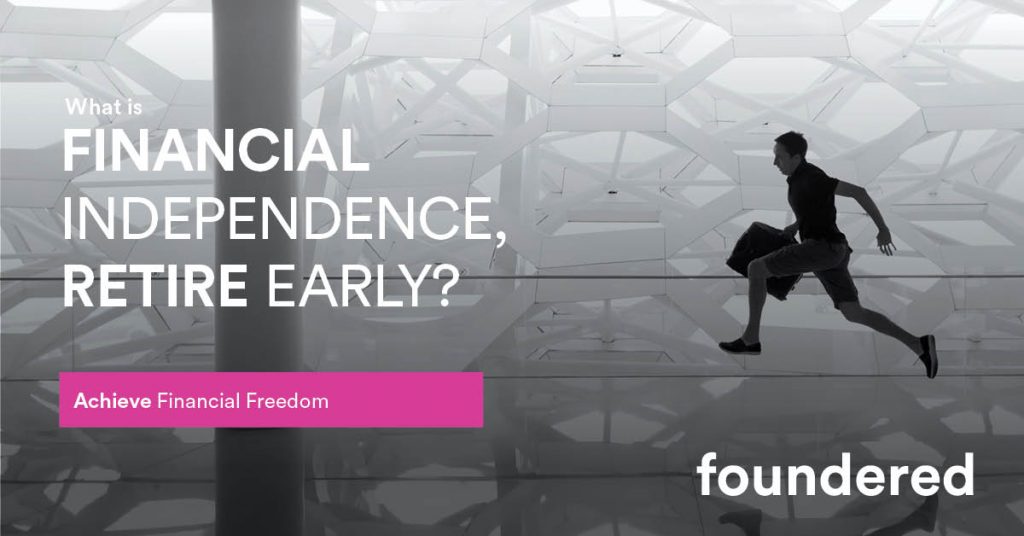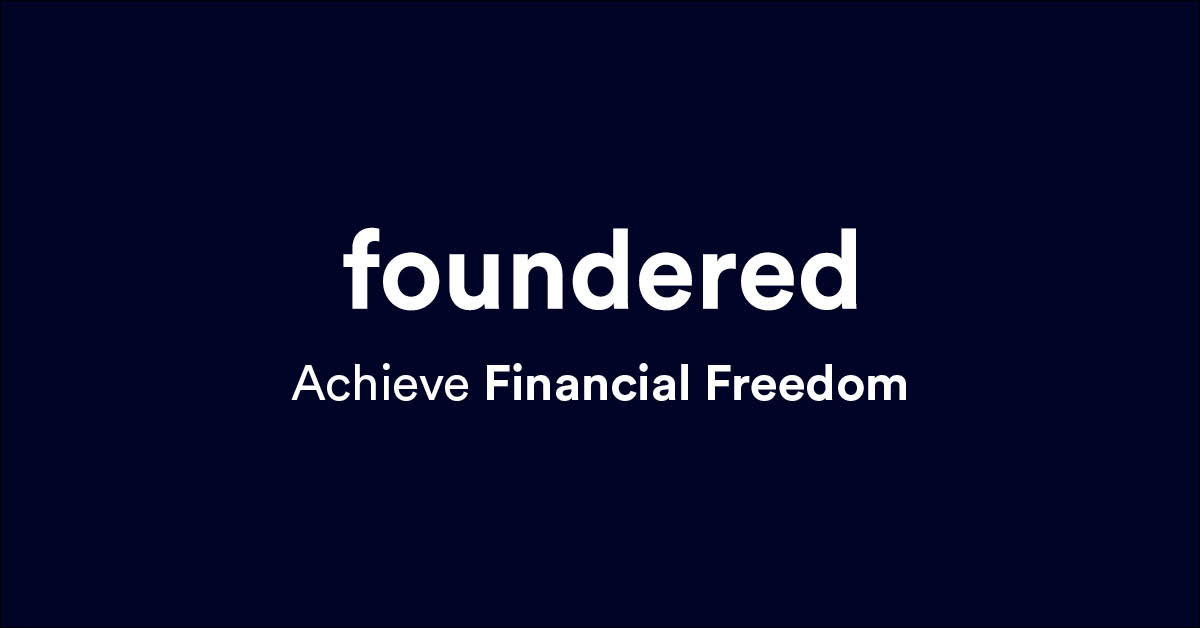What if you never had to worry about money ever again? What would your life be like if work was optional. For a growing number of people across the world, this is their new reality. No they haven’t won the lottery or received a huge inheritance.
These people have learned about the Financial Independence, Retire Early (FIRE) movement and set in motion a series of events, that has redefined their lives forever. I am one of these people and I am one of those who retired early (aged 40).

What is Financial Independence (FI)?
Financial independence occurs when you have enough wealth or income, to live the quality of life you desire without the need for work or employment. Income earned without having to work a job is commonly referred to as passive income.
This can take many forms and some of the most common passive income streams include: investment returns, dividends, rental properties and sale of digital assets you have created.
What does Retire Early (RE) mean?
In the UK, legally there is no definition of an early retirement and you can retire at any age. With this said, if you are born after 6 April 1978 you will not be able to receive your State Pension until age 68.
The current age you can draw from your any private/workplace pensions is from age 55. The UK government has confirmed plans to increase the minimum age you can access your pension to 57 from 2028.
Traditionally, retirement is focused around the dates you can draw your pensions and these are often the milestones people work their entire lives to meet. Commonly you’ll hear of people retiring at 55, 60 or 65. For the purpose of this site, whether you want to retire at age 54 or 29, we consider this early.
We’ve also highlighted the true definition of retirement in that it should not defined by age, but rather when you have enough money to stop working, if you choose to do so.
Achieving financial independence isn’t easy, but if I’ve whet your appetite and you want to learn how FIRE can be achieved, please read on!
How Financial Independence Retire Early Works
Those pursuing FIRE understand that through cutting back on their spending, they can use an increasing value of savings to buy income generating assets. Once these purchased assets generate an income greater than their expenses, they become financially independent. At this point, work becomes optional.
It’s important to point out that Financial independence can be achieved at any age. If you’re 50 and have no savings or 20 in your first job, you can still pursue FIRE. The important part is starting now!
Aren't the savings required quite extreme?
If you will live like no one else, later you can live like no one else.
Dave Ramsey Tweet
The FIRE Movement has been popularised by an American writer, Jacob Lund Fisker from Early Retirement Extreme and a blogger who goes by the moniker Mr Money Mustache. Jacob Lund Fisker is well known for his extreme frugality and famously living off $7000 a year in living expenses. Pete, Mr Money Mustache, also has no nonsense approach to spending and focuses on considerable frugality to increase his savings rate percentage.
Many of those focused on achieving financial independence will aim for a 70-80% savings rate which is well over 10x the UKs average household saving ratio, which was 6.8% in Quarter 4 2021.
Source: ONS
By comparison then, yes saving for your financial independence would be considered extreme. Anything over 50% savings will ensure your financial success. It may take time to achieve that as unless you’re without financial obligations, your current life costs something!
Personally, I achieved a pretty high savings rate. Not solely by cutting my expenses, but by also not letting my lifestyle costs increase as my income grew. While I made choices to bring a packed lunch over eating out, or cut back on subscription services, I always spent money on those things I valued.
At times though, the constant saving was a big pile of shite and incredibly monotonous. Especially in the early days. I had to constantly remind myself about delayed gratification and how this would benefit my own future.
Now on the other side of my financial independence retire early journey, I can say it was worth it. But being honest, it was tough at times.
Your situation and circumstances will be unique, but the goal is to increase your savings rate to as large a percentage of your income as possible. In doing so you can reduce the traditional working life from 40 years to 20 or even 10 years.
Want to achieve financial independence?
You could spend the next 13 years learning about personal finance and putting your knowledge into action. Or you could take my FREE 10 day mini course and weekly emails. I’ll show you exactly how to become financially independent. My only question is, whats stopping you?
How much do I need to become financial independent and to retire early?
In the financial year ending (FYE) 2020, the period immediately prior to the coronavirus (COVID-19) pandemic, average weekly household spending in the UK was £587.90. For ease of maths lets round this up to £600 or £31,200 annually. Once your savings reach approximately 30 times your yearly expenses, you could quit your day jobs or completely retire from any form of employment altogether.
The first point we need to address is that the less you spend, the less you will need saved. If your annual expenditure is £31,200, you will need approximately £936,000 saved. For a household spending £20,000 this is reduced to £600,000.
I have savings, now what?
There are caveats to achieving financial independence. A high saving rate alone will not normally enable you to become or stay financially independent. Our savings cannot just sit in a bank account to be eroded away by inflation. Our money needs to make money. We need to talk about investing.
For my parents, investing in the stock market was the same as gambling at the casino or racecourse. There was no certainty to a return at all, never mind positive returns. They would have picked individual stocks based on “tips” from an advisor. They would have lost money.
Today though, education and knowledge around investing is easily accessible online and right across the UK, there are fee-only Independent Financial Advisors that will be able to advise you on an investment strategy that suits your goals. You may also choose to buy other assets such as rental properties or short-term lets. When you have investments totalling approximately 30x your annual expenses, you should be able to live off your investment income in perpetuity.
Why 30x my spending?
There are no defined rules that predict the future income generated by your assets. In America using historical data, many expect a 4% return on their investments over the entire course of their life. This would mean that you need 25x your expenses invested to meet your investment income goals.
I’m a bit more cautious and work off a lower amount of 2.5%, however many in the UK think this is too prudent and it would be common to use 3-3.5% (33.3-28.5x) when planning how much you need saved. Again no hard and fast rules, but if you’re working to this value, you’re on the right path.
Variations on FIRE
There is no on style fits all within the Financial Independence retire early movement. What is right for you and your circumstances, won’t suit another. Some people will want to spend little, others will want a more luxurious lifestyle. Because of this some common designations of FIRE have well known terms within the movement. Usually these designations progress with an increase in annual spending.
- Coast Fire: Someone who has saved and invested enough to eventually retire one day. While their investments grow they take a part-time, often low stress job to cover current expenses.
- Barista Fire: You withdraw a small percentage of your investment portfolio allowing it to continue to grow. While doing so you supplement this with income.
- Lean Fire: When you live on a minimal or lean budget that covers your basic necessities such as food, transport and your accommodation.
- Fire: When all your expenses are met by your investments. Maintaining your current standard of living, adjusted for inflation over the long term. A UK FIRE budget would fall into the £600,000 to £900,000 example shown above.
- Chubby Fire: A middle class retirement with a value of investments above £2million
- Fat Fire: Usually reserved for those wanting a luxurious lifestyle and have savings/investments greater that £4million.
Why the F.I.R.E. Movement May Not Be for Everyone
- It is hard – The journey to financial independence takes time and intensity to gather momentum. It starts off very slow. Over time the compounding effect of your investments gathers pace like a snowball rolling down a mountain. After time, your investment growth will outpace your additional investments added. If consumer culture has proven anything is that we expect gratification now and the delay in it can put many people off trying.
- You need a large income – While you can and should start your journey to retirement on any income, building wealth through your savings is easier when you have a larger starting income. If you are on a lower income start planning opportunities to grow this through promotions, side hustles or starting your own business. Before I started my own business my largest salary was just over £20,000 per annum.
- Fire isn’t an emergency escape – Achieving FIRE is a wonderful achievement for any, but your problems still remain after you achieve it. If your sole desire is to retire early so you can escape going into work on Monday, you’re going to be disappointed.
When I achieve Financial Independence, do I have to retire early?
For those who have achieved “financial independence”, this doesn’t just mean sitting on some beach, endless days skiing or playing golf all the time. Although it absolutely could, what this really means is you have the opportunity to choose whether or not you want to work for an income.
For myself, I have been conditioned to be productive my entire career and while I welcome the downshifting in pace, I want to continue to provide value to my local and wider community. Another reason why this blog is important to me as an early retirement project. I no longer need to work for income and any work that I choose to do, will be solely because I want to do it.
I'm ready, what's next?
If after reading everything above you’re pumped and ready to start your FIRE journey I’ve got the roadmap to your early retirement coming up. I’ll cover each point in detail in future posts.
A step by step guide to achieving financial independence
- Pay down your high interest debt
- Build a 6 month emergency fund
- Max out your pension contributions
- Pay down your mortgage (optional)
- Open a Stocks and Shares ISA and max this out
- Open a general investment account and invest your savings in this regularly
- Once your pension reaches a level that will grow to the LTA by the time you are 57, stop adding contributions and put these to your general investments
- Invest savings in ISAs and your general account until you reach FI
- Option to retire early, if you choose to.
Final thoughts
The journey to financial independence retire early isn’t an easy one and often the sacrifices that you need to make feel never-ending. I can tell you though, that the reward for your efforts makes it all worthwhile. The freedom from the financial burden of worry that many have may never leave you, but I guarantee you when you achieve FIRE (Financial Independence Retire Early), it fades massively.
FAQs
FIRE is an acronym for the term Financial Independence Retire Early. This movement originated in the US and has gained traction in the UK, whereby those hoping to achieve FIRE look to retire before the normal retirement age without the need to work for income any longer.
Absolutely. While the FIRE movement originated in the United States, there are many in the UK following a similar path to achieve their own financial independence.
The biggest risk to retiring early surrounds the chance that you may run out of money in retirement. However with proper and prudent planning, you can mitigate this as much as possible.
There are quite a number of amazing money books and personally I’ve read many of them over the years. While few FIRE (Financial Independence Retire Early) books have come to market, there are a few that cover the topic and more are being released each month.
The theory behind FIRE (Financial Independence Retire Early) was first presented in the book – Your Money or Your Life by Vicki Robin & Joe Dominguez

